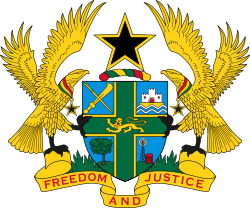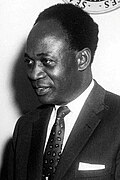History of the office
The country's first leader and prime minister was Kwame Nkrumah [1] of the Convention People's Party (CPP). [2] He held that post from the date of Ghana's independence – 6 March 1957 – until 1 July 1960, when a new constitution came into effect that abolished the position. Nkrumah became executive President of the Republic, but was later overthrown in a 1966 military coup.
When Ghana returned to civilian rule in 1969, the parliamentary system was restored. The Progress Party (PP), led by Kofi Abrefa Busia, won the parliamentary elections and Busia became Prime Minister on 1 October 1969. Busia's government was deposed in a military coup on 13 January 1972.
A presidential system was instituted in 1979 when civilian rule was re-established. The post of Prime Minister was never revived.
This page is based on this
Wikipedia article Text is available under the
CC BY-SA 4.0 license; additional terms may apply.
Images, videos and audio are available under their respective licenses.



